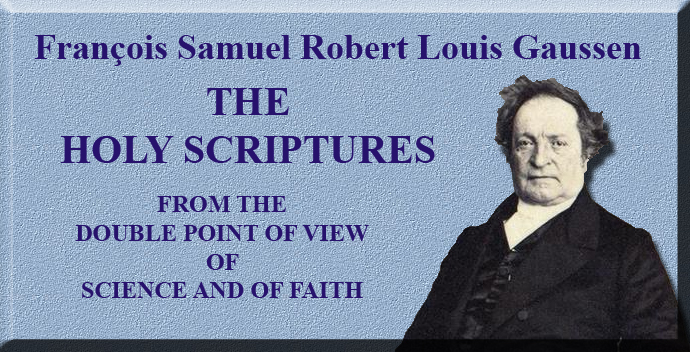
The Holy Scriptures
From the Double Point of View of Science and of Faith
By François Samuel Robert Louis Gaussen
Part Second - The Method of Faith
Book 1 - The Two Methods Open for the Knowledge of the Canon
Chapter 4
|
THE TRUE USE OF SCIENCE IN RELATION TO THE CANON. 418. THE legitimate office of historical and critical science in relation to the canon is not so much, as we have said, to lay the foundation of our faith, as to pave the way for it, to accompany, and to defend it. Our faith is otherwise founded — it is established on the declarations of God, and on His works. But when this faith is attacked in the name of science, it belongs to science better informed to reply to science — to undertake the examination of facts, and to shew that, properly handled, far from shaking our confidence, they serve ultimately to confirm it. For example, faith, relying on the divine testimonies, of which we shall speak presently, receives the firm assurance that the twenty-seven books of the New Testament, of which, at the present day, all the churches all over the world offer one. and the same collection, must necessarily have been divinely guarded as they were divinely given; for the same Providence, faith asserts, which for thirty-three centuries has miraculously preserved the Old Testament by means of the Jewish people, cannot have taken less care to preserve the books of the New by means of the Christian Church. But, in spite of this primary and living conviction, it may happen to our faith to hear voices claiming to be those of science make this objection, — If it be true that all the churches at the present day offer us the same New Testament, composed of twenty-seven books, and if it be true that twenty of them were never controverted, it is not less true that, before the last fifteen hundred years, seven others were, for a longer or shorter time, not acknowledged by a certain number of churches, will not this fact, then, shake your confidence, since it strikes at the very principle on which you found it, that is, the testimony of the churches which, according to you, is upheld by God? To this objection of science faith replies, by requesting it to apply itself to study the facts afresh with more attention; and we think it has been sufficiently shewn in the First Part of this work how, by attesting the freedom, the vigilance, and the holy jealousy of the first Christians in the question of the canon, science retracts, on the contrary, by describing the free and continuous testimony which all the churches have yviven at last with admirable constancy to the sacred collection of the Scriptures. Such is, then, its legitimate use in the matter of the canon; a use that even faith requests it-to give. It is a use of great importance, but indirect; real, but secondary and apologetic. Called to the useful task of preparing and encouraging our convictions, it is not required to lay their foundation; because it is by arguments of faith that the vital and profound confidence of a Christian soul is established in the sacred collection of our Scriptures. 419. We shall more firmly grasp this thought by comparing the task of historical -science with that which other branches of human knowledge fulfil, which have been alike employed to attack the Scriptures or to defend them. Many apologists have undertaken to prove the divine origin of revelation by its often wonderful agreement with the different discoveries by which mankind have been enriched. For example, one hundred and fifty years ago, the knowledge of manuscripts being yet in its infancy seemed to raise the most menacing objections against the integrity of the New Testament. The various readings of the Greek text, we were told, are counted by myriads, . and must fatally shake your confidence in its integrity. What was faith required to do? To appeal from demi-science to science better informed. And so, after an age of Herculean labours, the latter has ended by setting in the clearest light the wonderful insignificance of the various readings taken as a whole, and by confirming, even beyond its first expectation, the preservation of our sacred texts; thus demonstrating that an invisible Power has silently watched over our sacred books, and as the last result their text is found to be much purer than even pious men dared to hope. And it is this which, in their turn, history, astronomy, philology, anthropology, archaeology, and other branches of human knowledge have done, and will do, in favour of the Scriptures; though they have all been thought capable of opposing them, yet one after the other they have come to render their testimony to the Word of God. Are we to infer from this, that these different sciences are the human foundation of our faith? No, doubtless; — but only that each of them, properly interrogated, sufficed to repel the attacks that were attempted to be made in its name. Well, this is precisely what we must say of the science which has been named “The History of the Canon.” It can be very useful to us, no doubt, in resolving difficulties which come from the same quarter; but our faith in the sacred collection has another foundation; it appeals to a doctrine, This is the doctrine we now proceed to establish by the divine declarations, and by facts.
|
|
 |
 |
|
|
|
-
Site Navigation
 Home
Home What's New
What's New Bible
Bible Photos
Photos Hiking
Hiking E-Books
E-Books Genealogy
Genealogy Profile
Free Plug-ins You May Need
Profile
Free Plug-ins You May Need
 Get Java
Get Java.png) Get Flash
Get Flash Get 7-Zip
Get 7-Zip Get Acrobat Reader
Get Acrobat Reader Get TheWORD
Get TheWORD